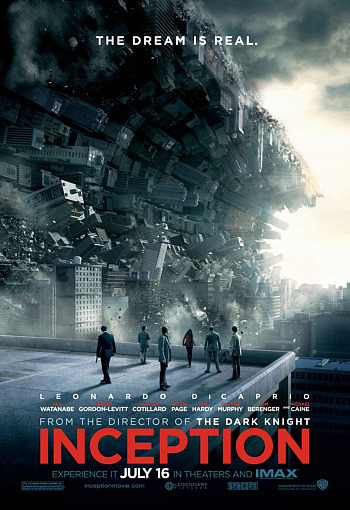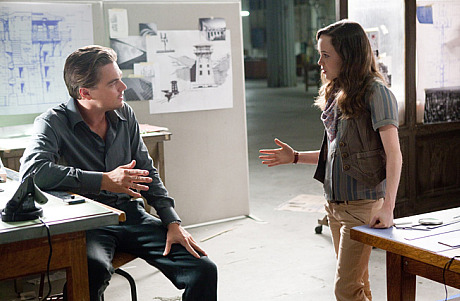Inception review sample #1: “Inception is a movie so vibrant, so alive, so relentlessly original that it can be forgiven its transgressions in an instant. It’s an entertainment with vivid, profound ideas, precisely the kind of daring that ought to be backed by big money.” — In Contention‘s Kris Tapley.
Inception review sample #2: “Imagine a film being made in 2010 where you have absolutely no idea where it is going or how it will end. These were the worlds created by revolutionary filmmakers, like Stanley Kubrick, Woody Allen, David Cronenberg and David Lynch. With Inception we have a film and a filmmaker that has broken new ground and very nearly reinvented the form, and without 3-D. Nolan gets there on the power of the story. See it on IMAX and it will blow your mind. I am sure more than a few will discover that seeing the movie in an altered state will also blow your mind, not that I’m advocating that.” — Awards Daily‘s Sasha Stone.
Inception review sample #3: “Inception is a masterpiece. Making a huge film with big ambitions, Christopher Nolan never missteps and manages to create a movie that, at times, feels like a miracle. And sometimes it doesn’t even feel like a movie; while presented in woefully retro 2D, Inception creates a complete sense of immersion in another world. The screen before you is just another layer of the dream.” — CHUD’s Devin Faraci.
Inception review sample #4: “Is it the first great movie of the summer? No — Toy Story 3 is. But Inception is probably the second great movie of the summer. Understand, a single viewing is hardly enough to come to terms with the film, which stars Leonardo DiCaprio, Joseph Gordon-Levitt, Ellen Page and Tom Hardy as a crack team that invades Cillian Murphy‘s dreams and find unimaginable perils in the subconscious. But that first viewing is enough to realize that Inception is a dense, stylish, thorny, dazzling film that delivers as a thrill ride but gives viewers lots to chew on and puzzle through. It is not a typical summer movie, but it’s bold and imaginative in the vein of the best summer movies; it’s way too big and spectacular to be an art film, but it can leave you scratching your head in a good way.” — TheWrap‘s Steve Pond.
Inception review sample #5:”A Kubrickian masterpiece with heart, Inception delivers and then some, thanks to clever original screenwriting and exhilarating mise-en-scene. When it opens July 16, this eye-popping film will wow moviegoers all over the world — its complexities will only encourage debate and repeat viewings — and should also score well with critics and year-end awards groups. Oscar nominations in technical categories are a certainty, but Inception is also a strong contender for multiple nominations, including Best Picture.” — Indiewire‘s Anne Thompson.
Inception review sample #6: “If movies are shared dreams, then Christopher Nolan is surely one of Hollywood’s most inventive dreamers, given the evidence of his commandingly clever Inception. Applying a vivid sense of procedural detail to a fiendishly intricate yarn set in the labyrinth of the subconscious, the writer-director has devised a heist thriller for surrealists, a Jungian’s Rififi, that challenges viewers to sift through multiple layers of (un)reality. Nolan places mind-bending visual effects and a top-flight cast in service of a boldly cerebral vision that demands, and rewards, the utmost attention. Even when its ambition occasionally outstrips its execution, Inception tosses off more ideas and fires on more cylinders than most blockbusters would have the nerve to attempt.” — Variety‘s Justin Chang
Inception review sample #7: “If you don’t follow [every aspect of Inception], join the club. It will perhaps take multiple viewings of these multiple dream states to extract all the logic and regulations. (At least that’s what the filmmakers hope.) Something else might come more easily on subsequent viewings: With incredibly tense situations suspended across so many dreams within dreams, all that restless energy might induce a kind of reverse stress in audiences, producing not quite tedium, but you may want to shout, ‘C’mon, let’s get on with it!’ This is especially true when the hectic action in one dream, a van rolling down a hill with its dreamers aboard, causes a hotel corridor to roll in another, producing a weightless state in the characters. Even Fred Astaire didn’t dance on the ceiling as much as these guys do.” — Hollywood Reporter‘s Kirk Honeycutt.
Inception review sample #8: “A stunning achievement and the most completely entertaining film I’ve seen in years. [Nolan] has made an utter crowd pleaser, an epic piece of entertainment that ultimately feels so simple precisely because of all of its complexity, and one that rouses and inspires and excites in the same way as blockbusters comprised of pure spectacle.” — Cinematical‘s Todd Gilchrist.
Inception review sample #9: “Inception, like Nolan’s earlier work, deals with a broken man, determined to fix his mistakes but only making things worse in the process. That could easily describe Memento or The Prestige or The Dark Knight or even his one remake, Insomnia. Yet even with Nolan returning to this idea, worrying at it, exploring different ways it can play out, he doesn’t feel like he’s stuck or marking time. I’d argue the opposite is true: by refining this idea over time and over different films and in different ways, Nolan is becoming merciless in his ability to engage both intellectually and emotionally. As a result, Inception flattened me, and even now, more than a week after my first viewing of it, I find myself turning over images and ideas from the film almost constantly.” — Hitfix‘s Drew McWeeny.
Inception review sample #10: “In terms of sheer originality, ambition and achievement, Inception is the movie of the summer, the movie of the year and the movie of our dreams. Director Christopher Nolan’s heist film about a group of dream extractors who can invade a person’s subconscious to steal — or plant — vital information may remind you of James Bond, The Matrix, or even Nolan’s own Memento, when in fact it’s unlike any other. A bold, inventive, audacious entertainment, Inception charts a new course for motion pictures and sets the bar very, very high. Matrix-style business should be in order, even though audiences will have to pay strict attention to get the full experience (perish the thought). Simplistic moviegoers who like their blockbusters cooked in predictability may not get it but Nolan fans and those who like their action married to new ideas will flock to multiplexes for repeated viewings.” — Boxoffice‘s Pete Hammond.
Inception review sample #11: “What is most infuriating about Inception is how close it gets to being something really great. Instead, we’re left with Solaris (but never as existential or as meditative) meets On Her Majesty’s Secret Service (but never as fun or thrilling). Compared to most of this year’s releases, Inception should still impress and, at the very least, inspire some worthwhile discussion, but it’s hardly the heady blockbuster summertime savior that audiences have been waiting for.” — Coming Soon‘s Silas Lesnick.



